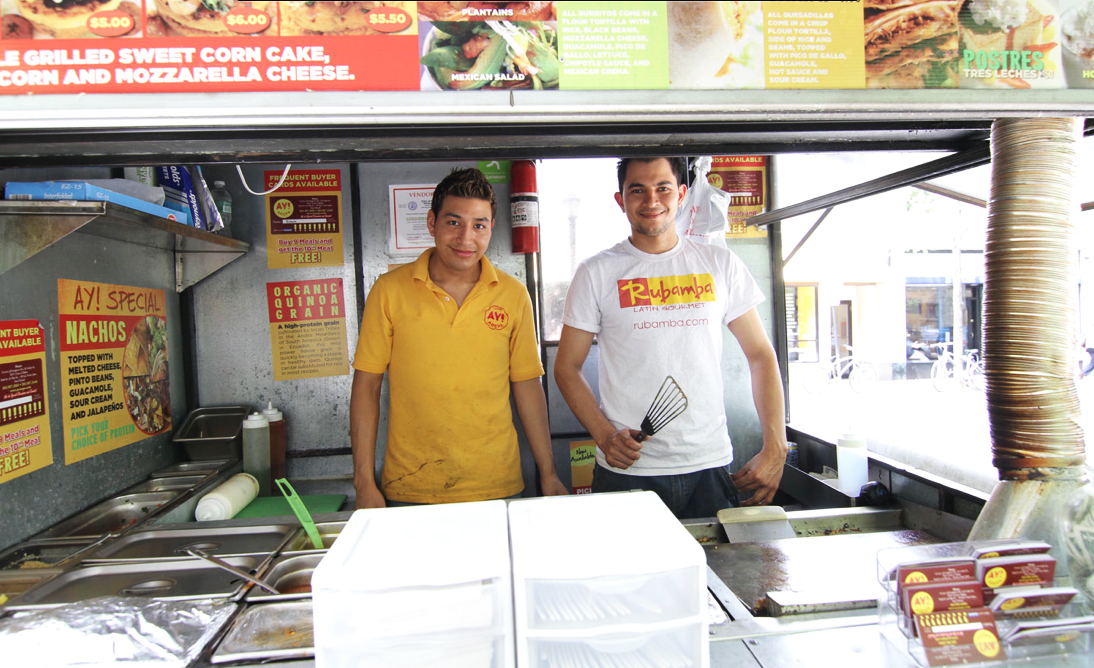
Hungry customers in downtown New Haven watched their favorite lunch stops roll away on Wednesday after the city ordered several food trucks to shut down operations at their current locations.
The city’s building department told at least three food trucks on campus that they could no longer park their trucks in their current locations. A representative from the building department handed the Portobello and Rubamba carts on York Street and the Caseus Cheese Truck on College Street copies of the New Haven food truck vendor ordinances, which regulate where and how food trucks can operate. The representative informed Portobello and Rubamba that they were being evicted from their location on York Street for violating the vendor ordinances. A city representative also informed workers at Caseus that the College Street food truck broke an ordinance prohibiting trucks from selling on a residential street, Caseus co-owner Tom Sobocinski said.
“We’ve been there for six years,” Sobocinski said. “We’ve never had a problem. I know that there are a lot more trucks in the past year than we have had previously. The only rule I was aware of was that you can’t park within 45 feet of a brick-and-mortar establishment.”
This is the first time in the Caseus food truck’s six-year run that it has been told not to sell on College Street, Sobocinski said.
Sobocinski added that he does not know what exactly constituted a residential street to the city’s building department. He said he had always assumed College Street did not fall under the category because buildings on both sides housed offices, classroom space and dormitories.
Victor Lopez, the Rubamba employee running the food truck Wednesday on York Street, said that he had just begun selling arepas around 11 a.m. when an official from the New Haven Building Department approached the cart and informed Lopez that he needed to shut down operations within an hour.
Rubamba owner Ernesto Garcia said that without the truck, which has served students and Elm City residents for nearly four years, Rubamba lost $1,000 in profits for the day. He said he approached the city about the truck’s future after receiving the notice that he cannot sell in a residential area. Garcia said he has tentative plans to move onto Broadway, but is mainly concerned about retaining his employees. He added that while he is currently seeking alternative locations for the truck, he intends to serve customers at his usual location Thursday.
Garcia added that the city informed him that people in the neighborhood filed complaints about customers obstructing pedestrian traffic.
“I’ve never had any complaints personally about my truck,” Sobocinski said. “We’re quiet and we’re small and we fit between two meters.”
The New Haven Building Department directed the News to James Turcio, explaining that he is the official in charge of enforcing vendor ordinances in New Haven. Turcio was named city building official last March, according to the New Haven Register.
Turcio could not be reached for comment Wednesday.
The removal of food trucks is unrelated to Yale University Properties, which leases and manages the block of retail space on Broadway adjacent to Rubamba and Portobello, said Michael Morand, deputy chief communications officer of Yale’s Office of Public Affairs & Communications.
Ethan Young ’18 said that the decision to remove the food trucks, unless done for health or safety reasons, only limits affordable dining options for students, faculty and nearby workers.
“We have this constant obsession with restaurant culture,” Young said. “Food is exceptional at nice restaurants, [but] there are not many small inexpensive options for students between classes. … Who else is going to walk by and need a to-go lunch?”
Greg Martell, the owner of Chief Brody’s Banh Mi — which also parks in front of Cross Campus on Thursdays and Fridays — said he would tentatively plan on returning to his usual location tomorrow because the city building department has not yet presented him with any papers. Martell added they still intend to hold a joint charity event with Caseus for local nonprofit Columbus House that the two trucks had planned for Thursday afternoon, even if they must choose a new location for their trucks.
Employees for other downtown food vendors, such as Crepes Choupette located on Wall Street and Ricky D’s Rib Shack on Chapel Street, said that they were unaware of the building department’s actions yesterday.
Graduate students interviewed emphasized both the convenient location of the Rubamba and Portobello trucks and their popularity among students who attend class in nearby buildings.
Shuosong Chen GRD ’21 said that he relied on the food trucks during weekends, which is when the dining hall at the Hall of Graduate Studies is closed.
For Rebecca Gilbert FES ’15, buying food at these trucks as a professional school student is preferable to eating at HGS or the Yale Law School. She said that although other cities may use zoning as a way to prevent trucks from stealing business from nearby brick-and-mortar stores, she did not consider these “fast food” trucks to be competitors of Blue State Coffee and Yorkside Pizza — establishments across the street from Rubamba and Portobello. Employees of both Blue State Coffee and Yorkside Pizza said they did not notice the removal of the trucks from their streets.
Rubamba opened its brick-and-mortar location on High Street in 2012.







